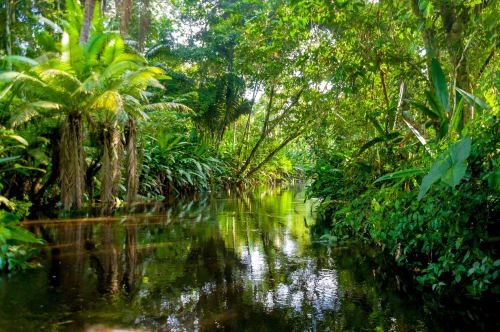Forests have been referred to as the green lungs of the earth due to their ability to clean air, maintain climatic temperature and biodiversity. Forests serve the same purpose to our planet just like the human lungs do to the human body in terms of filtering and provision of the body with oxygen. Trees use carbon dioxide (CO 2 ) through the process of photosynthesis to release oxygen (O 2 ) thereby making the air breathable and sustaining all living things on the planet.
Why Are Forests Called Green Lungs of the Earth?
Forests play crucial ecological functions just like the lungs do to a human body.
-
Oxygen Production:
Forests give out oxygen and take up carbon dioxide through the process of photosynthesis.
➤ One hectare of forest can supply oxygen for up to 18 people annually.
-
Carbon Dioxide Absorption:
Forests also serve as carbon sinks, which entraps carbon and prevents global warming. -
Air Filtration:
Leaves collect dust and pollutants thus enhancing the air naturally.
What is the role of forests in controlling the climate of the earth?
Forests assist in equalizing the global climatic regimes by:
-
Carbon sequestration: Sequestration of carbon in the soil and trees.
-
Temperature Control: Shades and cooling effects would be achieved using evapotranspiration.
-
Rainfall Formation: This is the release of water vapor which takes part in cloud formation and precipitation.
Example:
The Amazon Rainforest, which is termed as the Lungs of the Planet, generates about 20 per cent of all the oxygen in the atmosphere and influences the world weather patterns.

Ecological Benefits of Forests
| Function | Description | Benefit to Earth |
| Oxygen Production | Converts CO₂ to O₂ via photosynthesis | Supports life for all organisms |
| Carbon Storage | Absorbs and stores atmospheric carbon | Mitigates climate change |
| Soil Protection | Prevents erosion and maintains fertility | Supports agriculture and biodiversity |
| Water Regulation | Controls water flow and rainfall | Prevents floods and droughts |
| Habitat Provision | Shelter for countless species | Preserves ecosystem diversity |
Why Is Conserving Forests So Important?
Deforestation can cause irreversible environmental damage:
-
Rising CO₂ levels intensify climate change.
-
Reduced oxygen production worsens air quality.
-
Disrupted rainfall patterns lead to droughts or floods.
-
Biodiversity loss threatens food chains and ecosystems.
How Can We Protect Our Green Lungs?
-
Encourage afforestation and reforestation.
-
Prevent illegal logging and deforestation.
-
Support sustainable forest management.
-
Raise public awareness about the value of trees.
-
Promote eco-friendly lifestyles and tree-planting campaigns.
Conclusion
Forests are the real green lungs of the planet as they bring life giving oxygen and actually suck the harmful carbon dioxide. By conserving them, they will guarantee clean air, stable climates and a healthier ecosystem that will be available to the future generations.
Conserving forests is like conserving life itself, since once the green lungs die, so does the planet.
Comments
All Comments (0)
Join the conversation